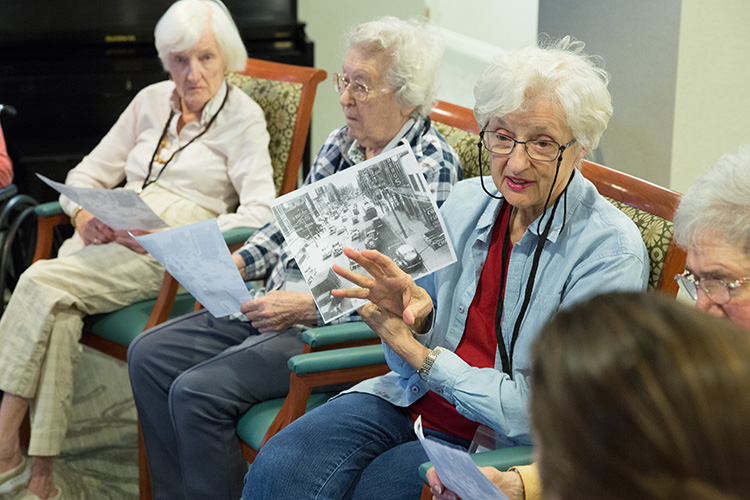Rebecca Mixtacki, a UW-Milwaukee graduate, passes around a black-and-white photo showing a downtown street scene from the mid-20th century to nine older women. Mixtacki sits next to Gloria Ristow, who is blind, and describes the photo.
One by one, the women offer their thoughts about what might be happening in the photo as Helena Enderle, a German exchange student studying sociology at UWM, writes the ideas down on a flip chart. As the students encourage the women to share their ideas, a story takes shape.
The scene shows downtown Milwaukee and it must be the summer because of the way people are dressed. “Is that Third Street?” “Is that a trolley wire?”
The afternoon storytelling collaboration is part of TimeSlips, an award-winning program that brings UWM student volunteers together with older adults with memory loss in assisted-living facilities to share and create stories.
Developed by Theatre Professor Anne Basting, the program recruits and trains students to work with resident with varying degrees of cognitive disabilities such as Alzheimer’s disease or dementia in the story-telling sessions.
Generations United honored TimeSlips earlier this year as one of three “programs of distinction” nationally that bring students together with older people. UWM’s Center for Community-Based Learning, Leadership and Research coordinates the program.
Students facilitate the storytelling by bringing in pictures and writing down what the group members come up with, but the residents create the final story. One may come up with a title, while others contribute a joke. “Every member feels involved by the story, and many of them start to smile when their story is re-read,” Enderle said.
Students commit to a semester of storytelling, but some stay for a full year and some, such as Mixtacki, come back after graduation. During the fall semester, 13 students were involved, volunteering at St. John’s on the Lake, Eastcastle Place, Jewish Home and Care Center and Milwaukee Catholic Home.
“The center has done an amazing job creating joyful experiences for students and people with memory loss in Milwaukee,” said Basting, founder and president of TimeSlips Creative Storytelling. “Our hope is that this program is replicated on campuses across the country.”
TimeSlips has benefits for students and residents.
“A lot of the students develop wonderful relationships with our residents,” said Angela Crimmings, LifeStreams coordinator at Saint John’s on the Lake. “The program helps alleviate the isolation of many older adults, and our residents have a wealth of knowledge they can offer, which the students might not learn in a classroom setting.”
The stories may stir memories, but the joy of creativity and socializing are just as important to the process, Crimmings said.
The residents in the Saint John’s on the Lake program have early- to mid-stage memory loss, but become engaged with the storytelling.
“We have a lot of folks who wrote and read for leisure as well as professionally,” Crimmings said. “It’s always interesting to see the stories they come up with.”
The students volunteer for different reasons, but all those interviewed said enjoyed their experiences.
“I love interacting with the residents,” said Carly Lubner, a freshman who plans to major in nursing. “I love to listen to all their stories from when they were growing up in Milwaukee – they teach me new things every day.”
Joyce Whitaker, a junior social work major, became interested when she was looking for service learning opportunities. She likes the process of helping develop stories. “We ask open-ended questions. We don’t correct their answers – we go with whatever they think is going on in the pictures. Once they get going, the stories just flow.”
“The first week, the residents were pretty quiet, but gradually they really got into it,” said Baylee Votava, a sophomore in the College of Health Sciences who works with residents at Eastcastle Place. “Last week was really cool. They made up a story, and then put themselves into it (the picture was of the Pfister Hotel in the 1940s). One was a receptionist; one was a doorman. I don’t know if any of that was true, but it’s awesome to see them build the story.”
The TimeSlips project has inspired students taking part to continue working in the field. Samantha Goodrich, a UWM theater graduate, still involved in TimeSlips, won a Student Start Up Challenge to start a theater company that works with people with memory loss.
Her group has held three workshops, using the TimeSlips method. On the final day, residents will give a performance of a musical play they have developed.
“Some of them are interested in the acting; others are more interested in the brainstorming. But people of all abilities get a chance to be part of the final production. Some are main characters; some are like a Greek chorus,” Goodrich said.
Goodrich hopes to affiliate with UWM’s TimeSlips program as she develops her ideas and expands the workshops into the community.
“This is my passion and I’m hoping to grow it, slowly but surely.”
Her late father had Alzheimer’s disease, but elective courses in community and participatory theater also developed Goodrich’s interest. “Those courses really opened my eyes to the power of creativity beyond entertainment. Entertainment is great, but that capability to engage the audience can bring to life a lot of incredible things.”







